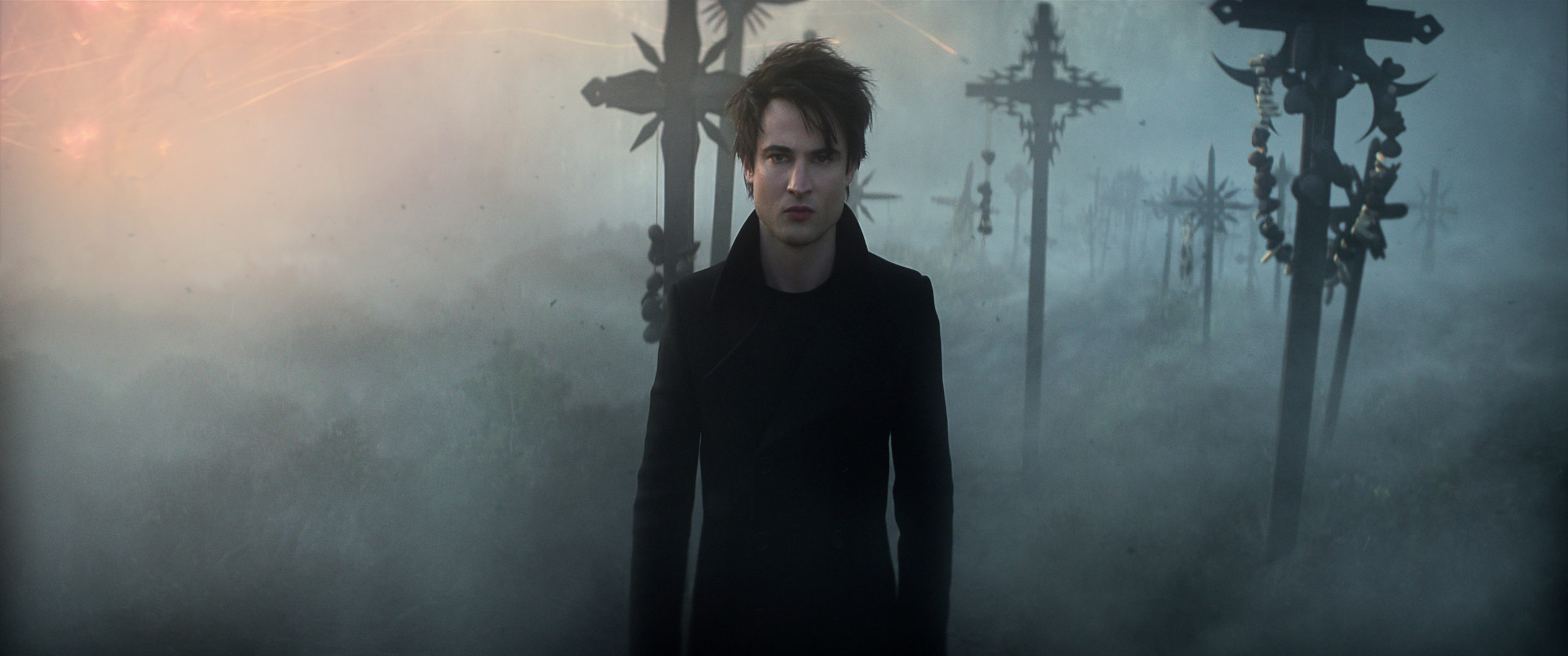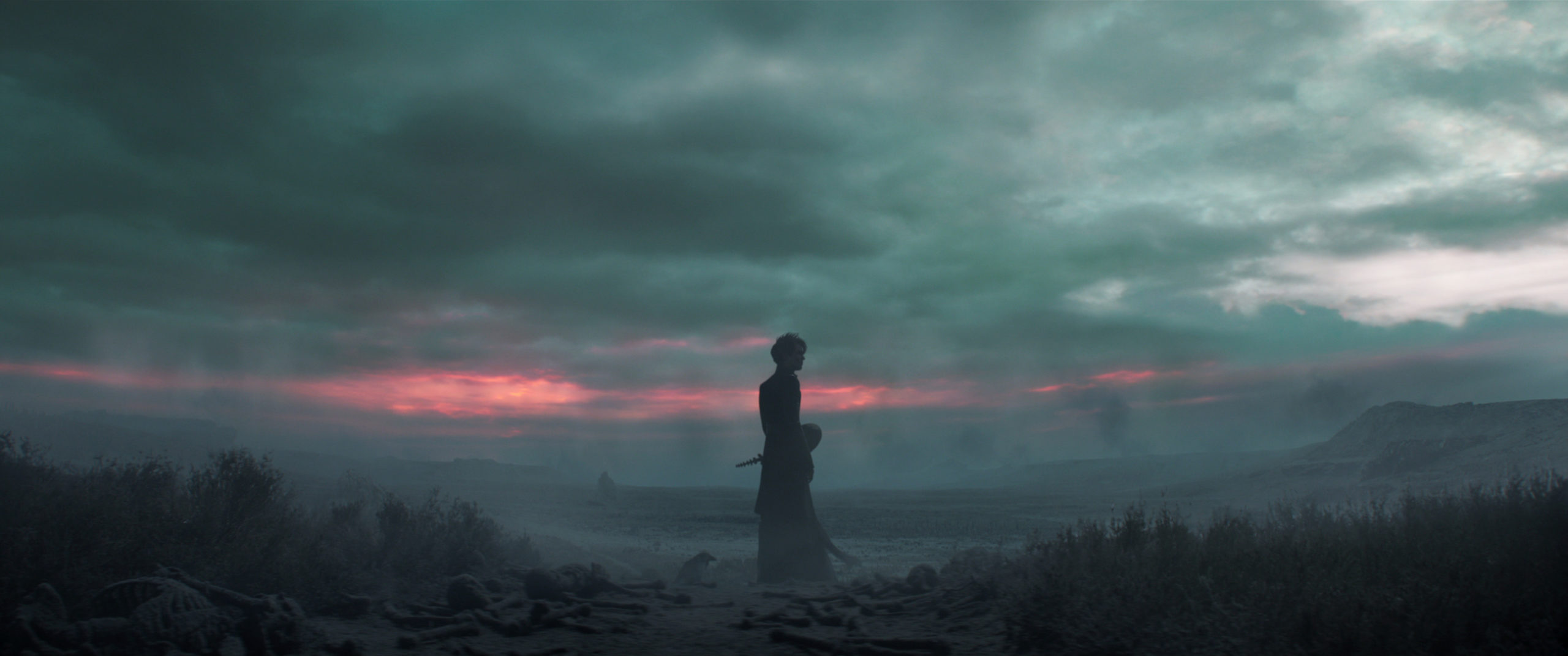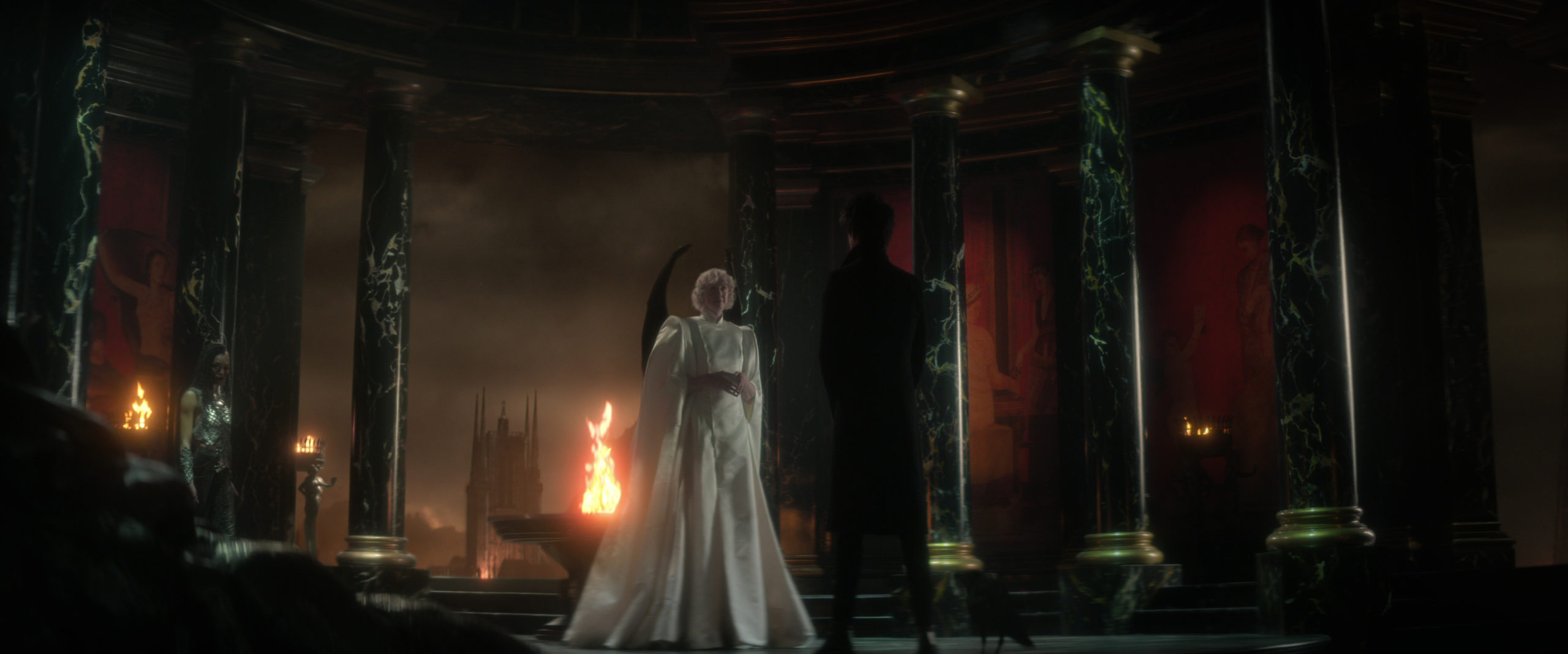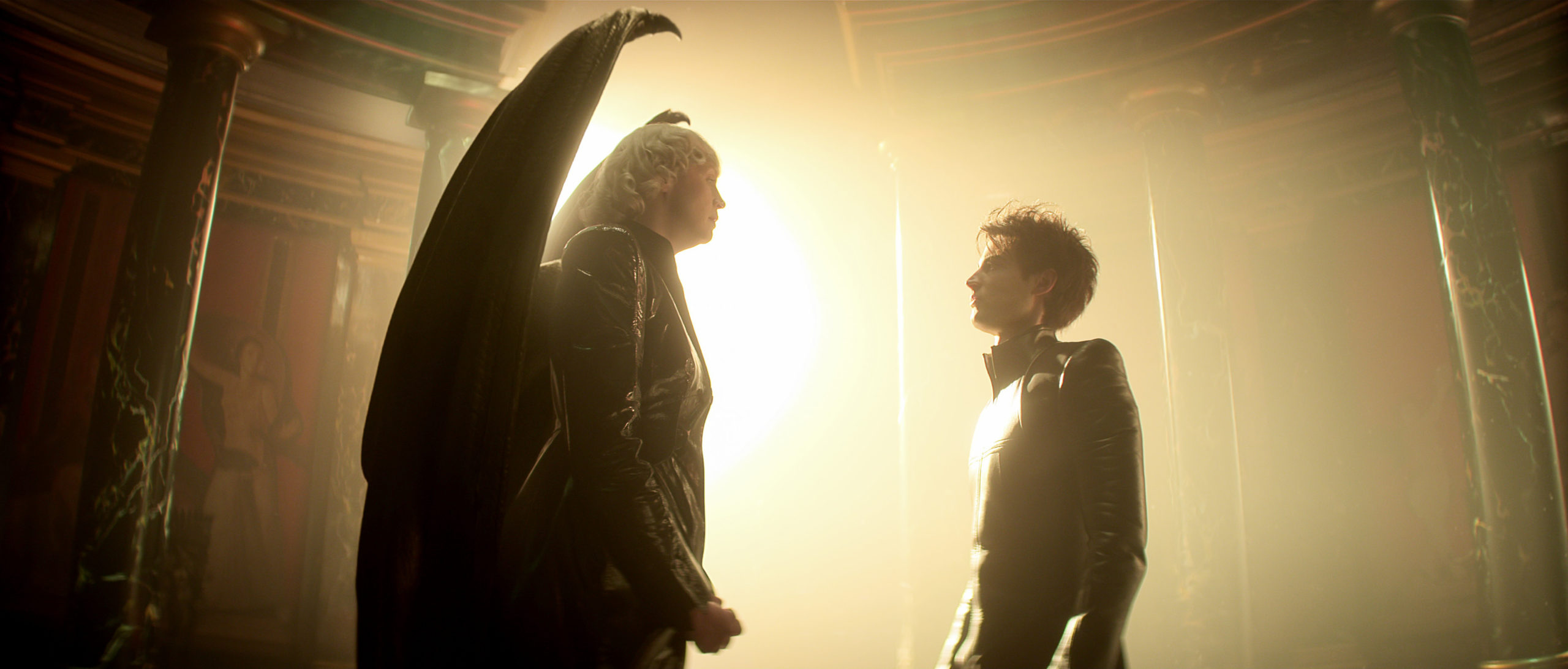
Dream and Matthew arrive in Hell, looking for the helm of power that Ethel Cripps traded away to a demon for an Amulet of Protection, which her son John Dee is now using to horrifying effect on his trek toward Dream’s ruby. Hell looks quite a bit like Mordor at first glance and is surprisingly cold according to Matthew, who is flabbergasted to discover that the underworld is real. Dream says that Hell is real “for some,” and suggests that in order to find Lucifer, they “follow the damned,” who are surprisingly compliant as they march single-file into Hell carrying their own flames.
The trees of hell are leafless, their trunks and branches made of writhing bodies. The walls of the caves and castle of Lucifer are lined with the bodies of the damned. Everything is literal and physical. Matthew, who is clearly serving as the audience surrogate and asks so many question as to get a little annoying about it, inquires as to why they need to ask to be let into Hell instead of just barging in. “There are rules, protocols which must be followed,” Dream explains. He cannot just enter Hell uninvited. We saw this sense of formality and propriety when he was so unfailingly polite to the Fates. He operates in worlds where rules, formality, and surface-level politeness are of high importance; worlds full of ancient, nearly omnipotent beings who only manage to stay in their lanes through the rigid application of social norms and comity. We’ll see this concept more or less embodied in the courtly and insincere Lucifer. A rhyming demon named Squatterbloat (right out of the books) taunts Dream at the gate of damnation. Morpheus introduces himself as “Ruler of the Nightmare Realms,” which is his way of going hard and stepping up to his surroundings. After all, the King of Dreams doesn’t sound nearly as badass as the Ruler of the Nightmare Realms. He reminds the taunting demon that his sovereign will not like to hear that he’s been rude to a guest, which he must be treated as, according to…what? The rules, of course. It’s subtle, but Dream overcomes the demon’s taunting by rhyming his final threat. “Shall I haunt your waking dreams? And your waking hours too? Or will you open the gates of hell and let us through?” It’s not the threat that causes the demon to let him in; it’s the word play. As we’ll see, besting someone through the use of words is considered a form of power in hell.

Dream and Matthew walk fields of ash and bone, while he explains his relationship and history with Lucifer Morningstar, the ruler of Hell. Lucifer used to be Samael, the most beautiful, wisest and most powerful of angels until God cast her out. He notes that Lucifer is more powerful than he is by far. Squatterbloat leads them past a prison of some kind and Morpheus notes that this isn’t the way to Lucifer’s palace. A woman calls out “Kai’ckul,” and rushes to her cell window. “I greet you, Nada,” says Dream, who appears to her as a young Black man. She says she prayed for this day and that she knew he would come. He says it pains him to see her like this and she begs him to free her. He tells her that it has been 10,000 years and that he still loves her, but that he has not forgiven her yet. Clearly, there’s a much larger story to be told here, one which will have to wait until next season. Suffice it to say that three very important things about Dream are established here. The first is that his appearance changes according to who is looking at him, which is true of most of the Endless (and is why the fan complaints about Kirby Howell-Baptiste portraying classic white-skinned goth chick Death are so misguided, not to mention racist). The second is that he has a messy romantic history – and boy, will that ever come into play throughout the rest of this tale. The third is that he’s a stone-cold bastard who is capable of damning his former lover to hell and leaving her there even when she pleads to be forgiven. She calls out that she will never give up hope, which will come back into play by the episode’s end. Dream explains to Matthew that Nada defied him and he responded by putting her in hell, as if that explanation settles the matter. He was shown her as a taunt by Lucifer; a way to unsettle him and throw him off his game.
Back on earth, John Burgess gets himself hit by a car, after which the kind and guilt-ridden driver Rosemary inexplicably gives him a ride. We think this entire sequence – of someone picking up a strange and clearly unwell man outside a hospital in his pajamas – might have worked if there were some indication that the amulet was affecting her judgment, or somehow the ruby was doing so from far away. Otherwise, her actions just don’t add up. Sure, she’s got a rottweiler named Susie in the car, but that’s not a guarantee of safety by any means. Rosemary is played by the recently Emmy-nominated Sarah Niles of Ted Lasso. She’s lovely in the scene, but the original story had John picked up by a white woman who he thanked at the end of the journey by shooting her in the face. It feels like the creators weren’t willing to go that dark with this scenario, possibly because of the racial implications, but it also feels like they didn’t spend so much as a minute unpacking the reality of a Black woman putting herself in that kind of situation in the first place. Why would any Black woman pick up some white man she doesn’t know and drive him around at night? “You’re a kind person” just doesn’t cut it. That’s delusional and reckless behavior, although it’s not portrayed that way at all. They chat during the ride and she tells the story of her husband’s unfaithfulness, declaring that lying is the worst thing a person can do to another person. In response, he casually admits that he stole from his mother and went to prison for arson and murder. Rosemary is, naturally, deeply unsettled by this. He goes on to talk about how all people are fundamentally selfish which is why they lie. She says that people lie because they’re afraid. She asks to stop for gas and tries to get the cashier’s attention to the call the cops, which goes as you would expect when there’s a crazy man with a magical amulet. John promises Rosemary he won’t hurt her because she’s taking him to his ruby and he has no reason to hurt her. Having just watched a man inexplicably explode, she’s understandably not feeling confident. In case anyone’s keeping score, the themes of this episode are hope, lies, and sticking to the rules.

Lucifer greets Dream cordially, but without anything that could be construed as sincerity. Hell is a place of power struggles and schemes, intrigue and word play. Christie is wonderful in the scene, pretentious and foreboding; someone so powerful (Dream says that the only being more powerful than her is God) that she doesn’t need to make overt power displays. She merely has to coo politely to get her menace across. Still, we can’t deny that there were more than a few disappointments here. The design of Lucifer’s palace is gorgeously foreboding on the outside. The massive stone gates with the glowing pentagram were kind of amazing. But we have to confess we found the art direction, costume design and makeup work to suddenly tumble in quality for the rest of the scene. We didn’t think the production design worked to convey the sense of horror that should’ve permeated these scenes. It just tended to look a slightly darker than normal cathedral on the inside. Worse, it looked like a set. Mazikeen and Choronzon’s demon makeup was disappointing and just looked slightly more horrifying than your average Star Trek alien. You can hear a bit more of our thoughts on why this scene disappointed (including our thoughts on Christie’s costumes) in today’s podcast.
Lucifer spends her time toying with him, asking after his family members and pretending to wonder if he’s come to ally himself, which would effectively make him her subordinate. She taunts his reliance on his tools and the embarrassment of being captured for a century by a mortal magician. “We expected better of you, sweet Morpheus.” As we noted in the podcast, Lucifer was originally more of an androgynous boy, drawn to look like the young David Bowie. The sweetness and taunting came off more sinister when it was a skinny young man than it does when it’s coming from an inherently imperious, femme-presenting figure. It’s not bad or wrong; it just feels like… Queen Elizabeth is ruling hell or something. But when combat is called, it’s notable how quickly she shifts into battle armor. It isn’t until Dream fully vanquishes her and is ready to leave her realm that Lucifer finally drops the act and vows to destroy him. Even then, Dream bows politely in response. She mocks his quest by summoning every demon in hell and assumes he’s given up when he leaves the balcony. But it would seem that he is going after his tools in a particular order, so that with each reclamation, he has what he needs to reclaim the next one. He uses the sand to identify the demon for him. We don’t want to be jerks here, but there are more than a few roles this season that are played by people who just don’t have the acting chops. Choronzon is in no way an important character, although he is a memorable one from the comics. The confrontation between him and Dream goes instantly flat because the actor is simply not on the same level. It turns out he’s a stand-up comic without much acting experience. It showed.

The combat is rendered nearly verbatim from the book and we wonder whether it fully comes across in a filmed version. Tom was nervous that it wouldn’t be explained well or that it would come off kind of goofy, but Lorenzo says he loved the originality. Each combatant stands across from the other and takes turn describing what form they are taking and how that form will subdue the other. It’s about asserting reality through word play between two beings who have immense power to actually mold reality. It’s why they each sustain physical wounds that are inflicted by describing them. The point is to outsmart the opponent with a move that they don’t know how to counter. It’s about illuminating the limitations of your opponent. It’s about humiliation. Neither Lucifer nor Dream would ever stoop so low as to resort to physical combat. There are rules, after all. Nada’s cries that she will never give up hope inspire Dream to make the winning move, knowing that Lucifer, for all her power, has never been able to destroy hope. The damned are sitting in their cells, still crying out in hope after ten millennia in hell. Gaiman uses anthromorphizations and archetypes the way ancient myths did; to illuminate extremely basic truths about humanity. Hope can’t be killed by anything. Having said that, “Dreams don’t fucking die, not if you believe in them” is just about the most cringeworthy line we’ve ever heard and it’s indicative of a growing undertone that feels a little too… televisual, for lack of a better word. We’ve noted the many ways the TV series has structured the story to make it appropriate for episodic television and one of the ways it does that is to give characters these little emotional arcs. Unfortunately, that often winds up turning into the cliched “Very Important Lesson” style of TV writing. Morpheus is millions of years old, a literal embodiment of the concept of dreaming. Sqwawking “Dreams don’t fucking die” in his face should have done nothing but irritate him.
Anyway, Choronzon refuses to give up the helm and Mazikeen throws him to the demons. Lucifer drops the act and says she has no intention of letting him leave, reminding him that dreams have no power in hell. “What power would Hell have if those here imprisoned were not able to dream of Heaven?” Dream asks her. That’s a sly and deadly knife in the ribs because Dream knows that the one thing that causes Lucifer pain is her banishment from Heaven. He found the one button Lucifer has, the one scar she bears, and pushed it. You don’t enter into a game of words with the King of Stories and expect to leave unwounded. He literally swaggers out of Lucifer’s castle and uses the helmet to locate the ruby, which John has kept in a storage facility. Morpheus tries to use it but experiences a powerful backlash because John somehow wished the ruby into being John-specific. John arrives shortly after Dream is knocked unconscious and takes the ruby. He gives the amulet of protection to Rosemary and walks off to “save the world.” And here is where every reader of the book pauses and takes a deep breath, knowing what comes next.
Sabyasachi: Menswear Collections Next Post:
THE SANDMAN, Chapter 5. 24/7
Please review our Community Guidelines before posting a comment. Thank you!



